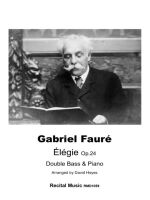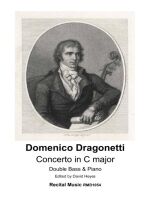Miniatures Book 1

Product code:
£12.50
Description
MINIATURES is an ongoing series featuring long-forgotten or unknown music, primarily by bassist-composers of the late 19th and early 20th-century, and is aimed at the intermediate bassist.
This series aims to bring a wealth of rare and neglected music back to life by creating new and accessible editions with accompaniments for both solo and orchestral tunings. Primarily in the orchestral register, including some passages in thumb position, each miniature is ideal as both recital and study repertoire, offering musical and technical challenges in equal measure.
The edition includes accompaniments for both solo and orchestral tunings.Zygmunt Noskowski – Elegy Polonaise
Noskowski (1846-1909) was born in Warsaw and was a Polish conductor, composer and teacher. He studied in Warsaw, Berlin and Kiel and subsequently taught many of the leading composers of succeeding generations, notably Karol Szymanowski. He was a prolific composer, writing in a conservative style, and his works include three operas, three symphonies, a ballet, orchestral works and chamber music.
Elegy Polonaise is originally for piano. Its poignant and evocative melody is played by the double bass contrasted by a more dance-like and rhythmic accompaniment.
Ludwig Emanuel Manoly – Albumblatt (Feuille d’Album) Op.15
Manoly (1855-1932) was born in Teresia-Opel, Hungary and studied at the Vienna Conservatoire with František Simandl (double bass) and Anton Bruckner (composition). He emigrated to America in 1876 and played with the Metropolitan Opera Orchestra and New York Philharmonic, and also taught at the New York Institute of Musical Art, now the Juilliard School.
Albumblatt is beautifully melodious, typical of the salon style of the late 19th-century, emphasising the lyrical and sonorous qualities of the double bass throughout its solo range.
Eduard Madenski – Träumerei
Madenski (1877-1923) was born in Vienna, studied at Vienna Conservatoire with František Simandl, and was a member of the Vienna Court Opera, State Opera and Vienna Philharmonic Orchestra. Madenski succeeded Simandl at the Vienna Conservatoire, also worked as a composer and soloist, and contributed to the revival of the double bass as a solo instrument becoming one of the greatest bassists after Simandl.
Träumerei (Dreaming) has a lilting and supportive accompaniment contrasting a lyrical melody and is played in treble clef throughout. A more animated middle section adds contrast and drama.
Max Dauthage – Abendlied
Dauthage (1862-1937) studied in Vienna with František Simandl and was a member of the Vienna Philharmonic Orchestra until his retirement in 1918. He also taught at the Vienna Conservatoire and composed a number of accessible and inventive works for the double bass.
Abendlied (Evening Song) is the first of 20 Melodic Pieces and was published in Vienna 1911. Written in a lyrical and post-romantic style, the solo line contrasts a supportive and chordal accompaniment.
Gustav Láska – Arietta
Láska (1847-1928) was born in Prague and studied with Josef Hrabě at the Prague Conservatoire and subsequently worked as a double bassist and conductor in Germany. He was a prolific composer writing operas, symphonic works, chamber and choral music, alongside a wealth of music for the double bass.Arietta was included in Book 2 of Láska’s Kontrabass-Schule (1904) and contrasts a lyrical and rhapsodic opening theme with music of a more dramatic and grandiose nature in the middle section.
Vojta Kuchynka – Canzonetta
Kuchynka (1871-1942) was a Czech double bassist and composer and from 1899- 1933 was Principal Bass of the National Theatre Orchestra in Prague. He gave over 600 recitals, was known as ‘the Kubelík of the double bass’, and was praised for his perfect technique and musical interpretation. He composed a wealth of music for the double bass, in a late-romantic and accessible style, and Recital Music is planning to publish all his works for double bass.
Canzonetta is originally for violin and piano and was first published in Prague in 1936. It is lyrical and engaging, with a contrasting folk-like middle section which adds drama and energy, with a supportive and rhythmic accompaniment providing colour and atmosphere.
Giuseppe M. Marangoni – Tempo di Minuetto
Marangoni (1866-1947) was an Italian double bass virtuoso, teacher and composer. He performed throughout Europe and America, taught in Italy and Greece, and composed many works for double bass including a Method which is still in print.
Tempo di Minuetto is the second movement from Sonata in Vecchio Stile Op.43 (Sonata in an Olden Style) and is a charming and elegant minuet in ternary form. The accompaniment is chordal and supportive using an inventive harmonic language which adds interest and contrast.
Description
MINIATURES is an ongoing series featuring long-forgotten or unknown music, primarily by bassist-composers of the late 19th and early 20th-century, and is aimed at the intermediate bassist.
This series aims to bring a wealth of rare and neglected music back to life by creating new and accessible editions with accompaniments for both solo and orchestral tunings. Primarily in the orchestral register, including some passages in thumb position, each miniature is ideal as both recital and study repertoire, offering musical and technical challenges in equal measure.
The edition includes accompaniments for both solo and orchestral tunings.Zygmunt Noskowski – Elegy Polonaise
Noskowski (1846-1909) was born in Warsaw and was a Polish conductor, composer and teacher. He studied in Warsaw, Berlin and Kiel and subsequently taught many of the leading composers of succeeding generations, notably Karol Szymanowski. He was a prolific composer, writing in a conservative style, and his works include three operas, three symphonies, a ballet, orchestral works and chamber music.
Elegy Polonaise is originally for piano. Its poignant and evocative melody is played by the double bass contrasted by a more dance-like and rhythmic accompaniment.
Ludwig Emanuel Manoly – Albumblatt (Feuille d’Album) Op.15
Manoly (1855-1932) was born in Teresia-Opel, Hungary and studied at the Vienna Conservatoire with František Simandl (double bass) and Anton Bruckner (composition). He emigrated to America in 1876 and played with the Metropolitan Opera Orchestra and New York Philharmonic, and also taught at the New York Institute of Musical Art, now the Juilliard School.
Albumblatt is beautifully melodious, typical of the salon style of the late 19th-century, emphasising the lyrical and sonorous qualities of the double bass throughout its solo range.
Eduard Madenski – Träumerei
Madenski (1877-1923) was born in Vienna, studied at Vienna Conservatoire with František Simandl, and was a member of the Vienna Court Opera, State Opera and Vienna Philharmonic Orchestra. Madenski succeeded Simandl at the Vienna Conservatoire, also worked as a composer and soloist, and contributed to the revival of the double bass as a solo instrument becoming one of the greatest bassists after Simandl.
Träumerei (Dreaming) has a lilting and supportive accompaniment contrasting a lyrical melody and is played in treble clef throughout. A more animated middle section adds contrast and drama.
Max Dauthage – Abendlied
Dauthage (1862-1937) studied in Vienna with František Simandl and was a member of the Vienna Philharmonic Orchestra until his retirement in 1918. He also taught at the Vienna Conservatoire and composed a number of accessible and inventive works for the double bass.
Abendlied (Evening Song) is the first of 20 Melodic Pieces and was published in Vienna 1911. Written in a lyrical and post-romantic style, the solo line contrasts a supportive and chordal accompaniment.
Gustav Láska – Arietta
Láska (1847-1928) was born in Prague and studied with Josef Hrabě at the Prague Conservatoire and subsequently worked as a double bassist and conductor in Germany. He was a prolific composer writing operas, symphonic works, chamber and choral music, alongside a wealth of music for the double bass.Arietta was included in Book 2 of Láska’s Kontrabass-Schule (1904) and contrasts a lyrical and rhapsodic opening theme with music of a more dramatic and grandiose nature in the middle section.
Vojta Kuchynka – Canzonetta
Kuchynka (1871-1942) was a Czech double bassist and composer and from 1899- 1933 was Principal Bass of the National Theatre Orchestra in Prague. He gave over 600 recitals, was known as ‘the Kubelík of the double bass’, and was praised for his perfect technique and musical interpretation. He composed a wealth of music for the double bass, in a late-romantic and accessible style, and Recital Music is planning to publish all his works for double bass.
Canzonetta is originally for violin and piano and was first published in Prague in 1936. It is lyrical and engaging, with a contrasting folk-like middle section which adds drama and energy, with a supportive and rhythmic accompaniment providing colour and atmosphere.
Giuseppe M. Marangoni – Tempo di Minuetto
Marangoni (1866-1947) was an Italian double bass virtuoso, teacher and composer. He performed throughout Europe and America, taught in Italy and Greece, and composed many works for double bass including a Method which is still in print.
Tempo di Minuetto is the second movement from Sonata in Vecchio Stile Op.43 (Sonata in an Olden Style) and is a charming and elegant minuet in ternary form. The accompaniment is chordal and supportive using an inventive harmonic language which adds interest and contrast.



